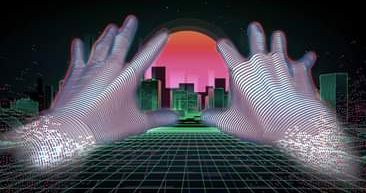Sustainability comes to the happiest place on Earth! Solar power helps make this Disney World McDonald’s one of the first net-zero fast food restaurants.




Researchers have developed a method to ‘squeeze’ visible light in order to see inside tiny memory devices. The technique will allow researchers to probe how these devices break down and how their performance can be improved for a range of applications.
The team, led by the University of Cambridge, used the technique to investigate the materials used in random access memories, while in operation. The results, reported in the journal Nature Electronics, will allow detailed study of these materials, which are used in memory devices.
The ability to understand how structural changes characterize the function of these materials, which are used for low-power, ultra-responsive devices called memristors, is important to improve their performance. However, looking inside the 3D nanoscale devices is difficult using traditional techniques.
China shows off its ability to rapidly launch 48 weaponized drones from the back of a truck, as well as from helicopters.



EGGs have very long tails and are approximately 100 AU (astronomical units) across.
They are being photoevaporated more slowly than their lower density surroundings, and so are left behind as the gas around them is driven off.
J025157.5+600606 is a so-called free-floating evaporating gaseous globule (frEGG).

Chemical space contains every possible chemical compound. It includes every drug and material we know and every one we’ll find in the future. It’s practically infinite and can be frustratingly complex. That’s why some chemists are turning to artificial intelligence: AI can explore chemical space faster than humans, and it might be able to find molecules that would elude even expert scientists. But as researchers work to build and refine these AI tools, many questions still remain about how AI can best help search chemical space and when AI will be able to assist the wider chemistry community.
Outer space isn’t the only frontier curious humans are investigating. Chemical space is the conceptual territory inhabited by all possible compounds. It’s where scientists have found every known medicine and material, and it’s where we’ll find the next treatment for cancer and the next light-absorbing substance for solar cells.
But searching chemical space is far from trivial. For one thing, it might as well be infinite. An upper estimate says it contains 10180 compounds, more than twice the magnitude of the number of atoms in the universe. To put that figure in context, the CAS database—one of the world’s largest—currently contains about 108 known organic and inorganic substances, and scientists have synthesized only a fraction of those in the lab. (CAS is a division of the American Chemical Society, which publishes C&EN.) So we’ve barely seen past our own front doorstep into chemical space.

(Front row from left) Expedition 64 crew members Kate Rubins, Sergey Ryzhikov and Sergey Kud-Sverchkov join Expedition 63 crew members (back row from left) Ivan Vagner, Anatoly Ivanishin and Chris Cassidy inside the space station’s Zvezda service module. N…
NASA astronaut Kate Rubins and cosmonauts Sergey Ryzhikov and Sergey Kud-Sverchkov of the Russian space agency Roscosmos joined Expedition 63 Commander Chris Cassidy of NASA and cosmonauts Anatoly Ivanishin and Ivan Vagner aboard the International Space Station when the hatches between the Soyuz spacecraft and the orbiting laboratory officially opened at 7:07 a.m. EDT.
The arrival temporarily restores the station’s crew complement to six for the remainder of Expedition 63.
Expedition 64 begins Wednesday, Oct. 21, with the departure of Cassidy, Vagner, and Ivanishin in the Soyuz MS-16 spacecraft that brought them to the station on April 9. Cassidy will hand command of the station to Ryzhikov during a ceremony with all crew members that is scheduled for 4:15 p.m. Tuesday, Oct. 20 and will air live on NASA Television and the agency’s website.

And more countries could be signing soon.
NASA released the draft of the accords to other space-faring countries, and after getting their input, the agency came up with the final document, which includes standards for things like lunar mining and how to handle conflicts on the Moon’s surface. NASA Administrator Jim Bridenstine says the main goal is to get everyone on the same page about lunar exploration and head off any future international misunderstandings or conflicts. “When we think about the Artemis Accords, what we’re trying to do is establish norms of behavior that every nation can agree to,” Bridenstine said during a press call ahead of the announcement.
The seven nations that have signed along with the US are: Australia, Canada, Japan, Luxembourg, Italy, the United Kingdom, and the United Arab Emirates. NASA says that it has also spoken with other countries interested in signing, but these seven nations were able to go through the interagency process the fastest. That means more countries could be signing on to the accords very soon — even before the end of the year, according to NASA. “This first announcement is very much a beginning, not an ending to the nations joining the Accords,” Mike Gold, NASA’s acting associate administrator for the office of international and interagency relations, said during the briefing.